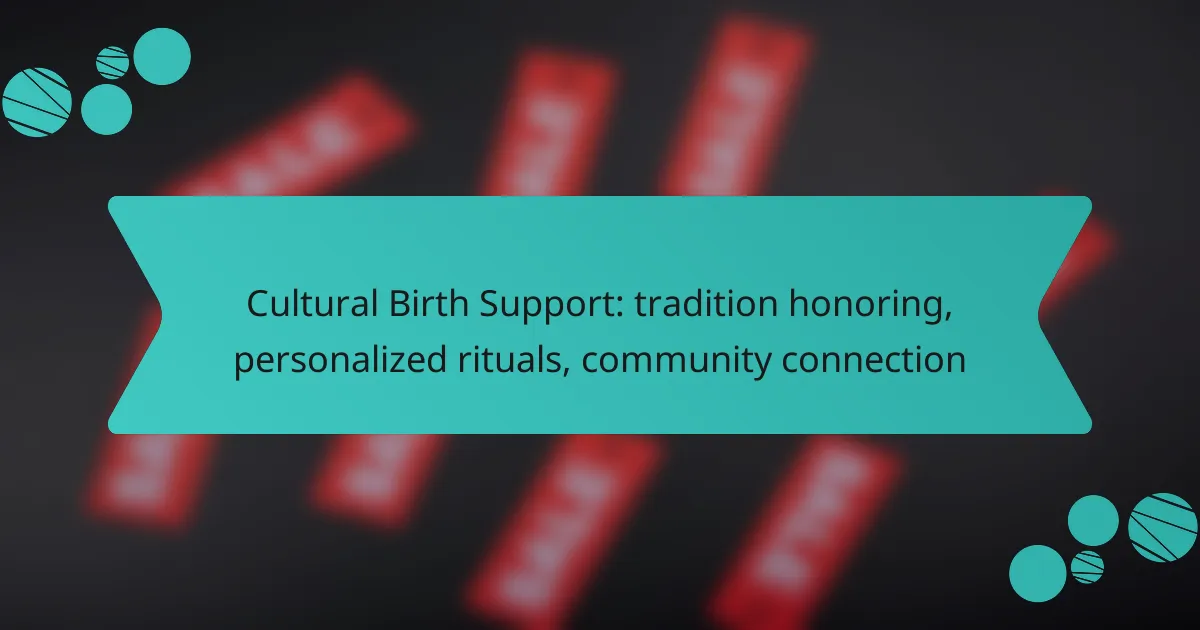Cultural birth support serves to deepen community connections by celebrating shared values and traditions during the transformative experience of childbirth. Through personalized rituals, families are embraced by their communities, fostering bonds and creating a nurturing environment that honors the arrival of new life.
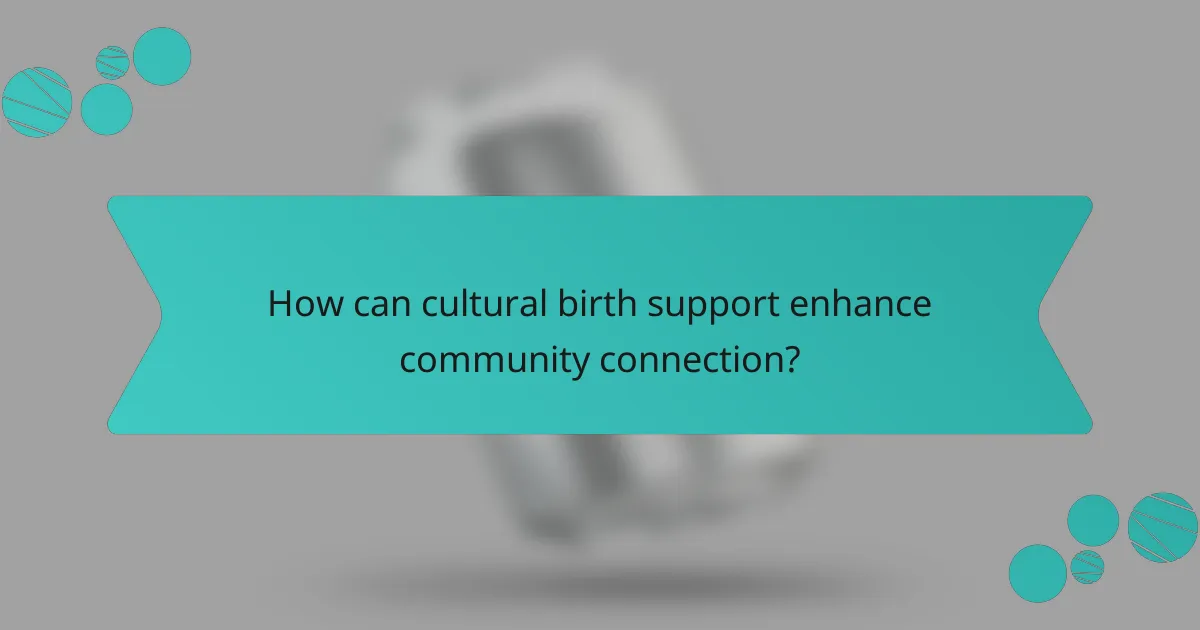
How can cultural birth support enhance community connection?
Cultural birth support enhances community connection by fostering a sense of belonging and shared values among individuals. Through personalized rituals and traditions, communities can strengthen their ties and create a supportive environment for families during the birth process.
Strengthens local bonds
Cultural birth support practices often involve the participation of family and community members, which helps to reinforce local bonds. When individuals come together to celebrate a birth, they share in the joy and responsibility of welcoming a new life, creating lasting relationships.
For example, in many cultures, it is customary for neighbors to bring food or assist with household chores during the postpartum period. This collective effort not only supports the new family but also deepens connections among community members.
Encourages shared experiences
Shared experiences during birth rituals can create a sense of unity and understanding within a community. When families engage in traditional practices, they pass down stories and values that resonate with others, fostering a collective identity.
Participating in communal events, such as blessing ceremonies or baby showers, allows individuals to bond over common experiences, reinforcing their cultural heritage and shared beliefs.
Facilitates support networks
Cultural birth support often leads to the formation of robust support networks that are crucial for new parents. These networks can provide emotional, physical, and informational assistance, making the transition into parenthood smoother.
For instance, local parenting groups may emerge from cultural practices, offering resources and a platform for parents to share advice and experiences. This interconnectedness ensures that families do not navigate the challenges of parenthood alone, enhancing their overall well-being.
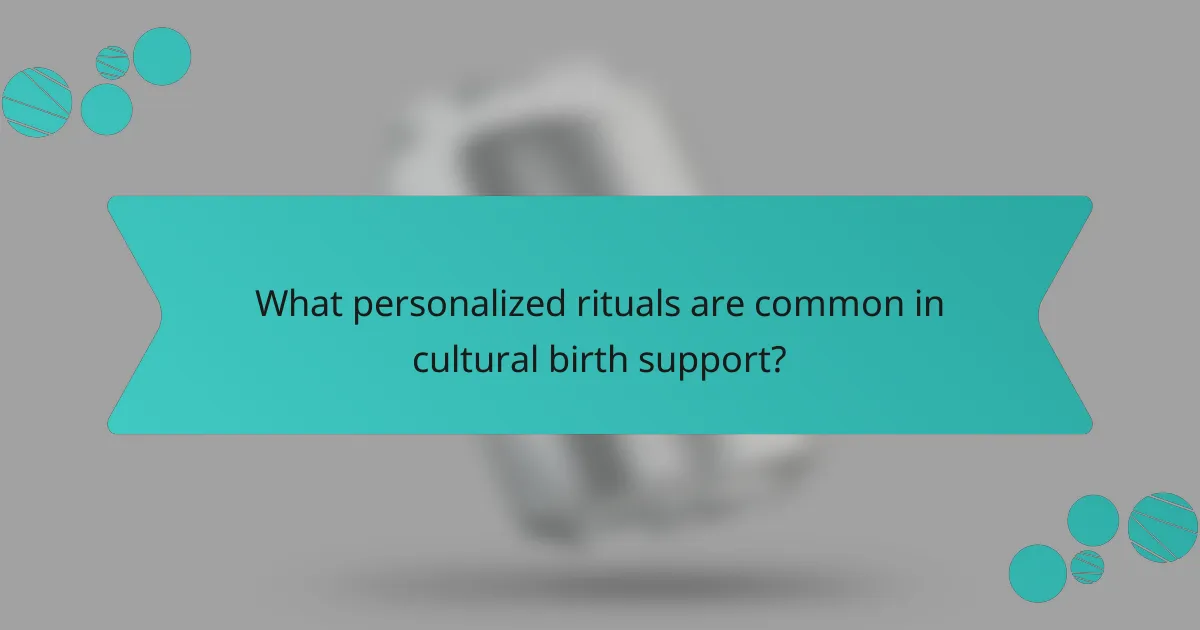
What personalized rituals are common in cultural birth support?
Personalized rituals in cultural birth support often include unique practices that celebrate the arrival of a new life, foster family bonds, and connect the community. These rituals can vary widely across cultures but typically emphasize welcoming ceremonies, family involvement, and traditional blessings.
Welcoming ceremonies
Welcoming ceremonies are significant events that mark the birth of a child, often involving family and community members. These ceremonies can include naming rituals, where the child is given a name that holds cultural or familial significance, and may involve specific prayers or songs that honor the newborn.
In many cultures, these ceremonies are accompanied by traditional foods and communal gatherings, reinforcing social ties and support networks. For example, in some African cultures, a naming ceremony can take place a week after birth, inviting extended family to participate in the celebration.
Family involvement practices
Family involvement practices in birth support emphasize the role of relatives in the birthing process and early child-rearing. This can include the presence of grandparents or siblings during labor and delivery, providing emotional and physical support to the birthing person.
In certain cultures, it is common for family members to take on specific roles, such as preparing meals or caring for older siblings, allowing the new parents to focus on their newborn. Engaging family in this way fosters a sense of unity and shared responsibility, which can be crucial during the early days of parenthood.
Traditional blessings
Traditional blessings are rituals performed to invoke protection and good fortune for the newborn. These blessings can vary by culture, often incorporating prayers, chants, or symbolic gestures that reflect the community’s beliefs and values.
For instance, in some Indigenous cultures, a shaman or elder may perform a blessing ceremony that includes the use of sacred herbs or water to cleanse and protect the child. Such practices not only honor the child but also reinforce cultural heritage and community identity.
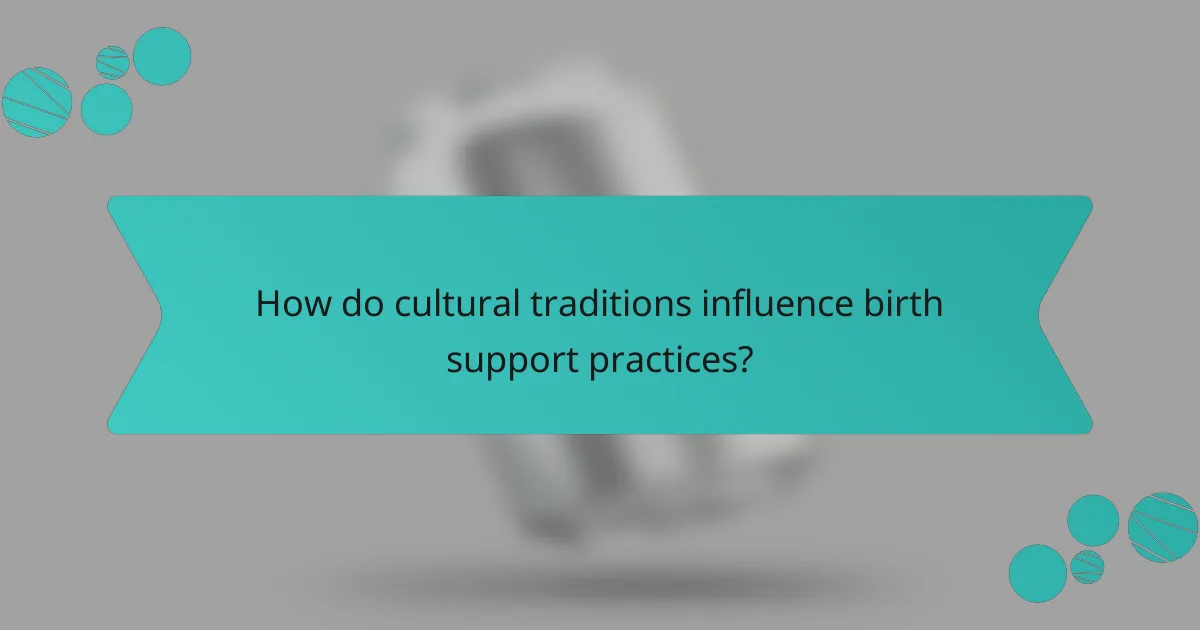
How do cultural traditions influence birth support practices?
Cultural traditions play a significant role in shaping birth support practices by providing frameworks for rituals, community involvement, and emotional support. These practices often reflect the values and beliefs of a community, influencing how families approach childbirth and the support they seek.
Variations across cultures
Birth support practices vary widely across cultures, reflecting unique traditions and beliefs. For instance, in some Indigenous cultures, midwives are central figures, often supported by family members during labor. In contrast, many Western cultures may emphasize hospital births with medical professionals, limiting family involvement.
Additionally, rituals such as naming ceremonies or postpartum celebrations can differ. In certain African cultures, elaborate ceremonies mark the transition into parenthood, while in others, simpler gatherings may suffice. These variations highlight the diverse ways communities celebrate and support childbirth.
Historical significance
The historical significance of birth support practices is rooted in the need for community and shared knowledge. In ancient societies, childbirth was often a communal event, with women supporting each other through labor and delivery. This practice not only provided physical assistance but also emotional reassurance, fostering strong community bonds.
Over time, as medical practices evolved, many traditional methods were overshadowed by hospital births. However, the resurgence of interest in natural and home births reflects a growing recognition of the importance of cultural traditions in providing holistic support during childbirth.
Modern adaptations
Modern adaptations of birth support practices often blend traditional rituals with contemporary approaches. Many families today seek to incorporate cultural elements into hospital births, such as using specific music, prayers, or family involvement to create a familiar environment. This fusion allows for a personalized birth experience that honors cultural heritage.
Furthermore, the rise of doula services has enabled a revival of traditional support roles, providing emotional and physical assistance that aligns with cultural practices. Doulas often work to ensure that the birthing experience respects the family’s cultural values, bridging the gap between modern medicine and traditional support systems.
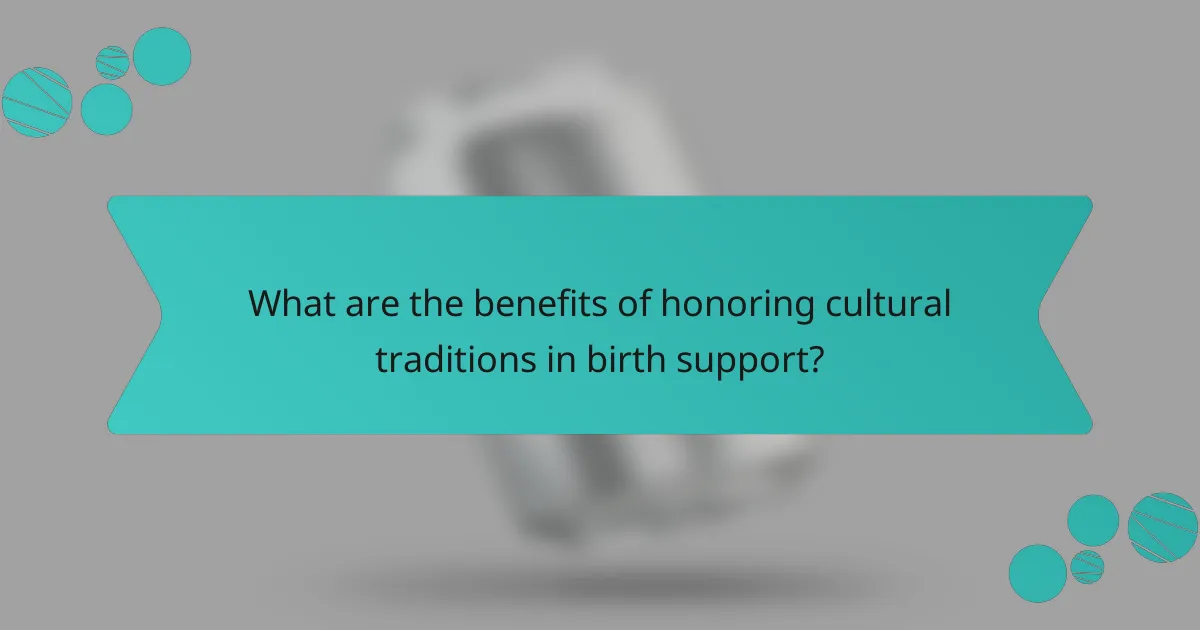
What are the benefits of honoring cultural traditions in birth support?
Honoring cultural traditions in birth support fosters a sense of belonging and emotional security for families. These practices create personalized rituals that strengthen community ties and enhance the overall birthing experience.
Emotional well-being
Engaging in cultural traditions during birth can significantly enhance emotional well-being for both parents and newborns. Rituals such as blessing ceremonies or family gatherings provide support and reassurance, reducing anxiety and fear associated with childbirth.
Communities often come together to celebrate these traditions, creating a network of support that can alleviate stress. This communal involvement can lead to a more positive birthing experience, as families feel surrounded by love and encouragement.
Identity reinforcement
Honoring cultural practices during birth reinforces personal and communal identity. Families can connect with their heritage through specific rituals, which can instill a sense of pride and belonging in both parents and children.
For instance, incorporating traditional music or clothing can help families feel more grounded in their cultural identity. This connection can be particularly meaningful for children as they grow, providing them with a strong sense of who they are and where they come from.
Enhanced family legacy
Participating in cultural birth traditions contributes to the creation of a family legacy that can be passed down through generations. These practices often include storytelling, rituals, or heirloom items that symbolize family history and values.
By actively engaging in these traditions, families can ensure that their cultural narratives are preserved and celebrated. This not only strengthens family bonds but also provides future generations with a rich tapestry of their ancestry to draw upon.
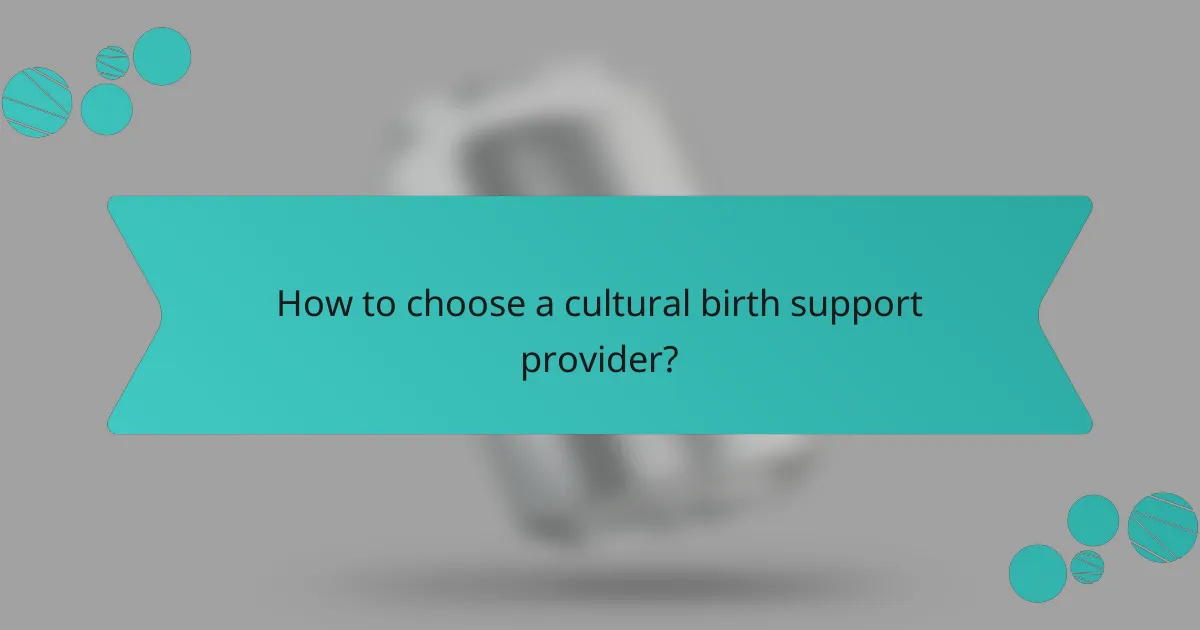
How to choose a cultural birth support provider?
Choosing a cultural birth support provider involves evaluating their understanding of your cultural needs, the services they offer, and the feedback from your community. Prioritize providers who respect and incorporate your traditions into their support practices.
Assessing cultural competency
Cultural competency in birth support means the provider understands and respects your cultural beliefs and practices related to childbirth. Look for providers who have experience working with your specific cultural group and can demonstrate knowledge of your traditions.
Ask potential providers about their training and experience in cultural practices relevant to your community. This can include their familiarity with rituals, dietary restrictions, and family involvement during the birthing process.
Understanding service offerings
Different birth support providers may offer varying services, such as prenatal education, labor support, and postpartum care. It’s essential to clarify what services are included and how they align with your cultural practices.
For example, some providers may offer personalized rituals or ceremonies that honor your cultural traditions. Ensure that these offerings resonate with your expectations and needs for the birthing experience.
Evaluating community feedback
Community feedback is a valuable resource when selecting a cultural birth support provider. Seek recommendations from friends, family, or local community groups who have had positive experiences with specific providers.
Online reviews and testimonials can also provide insights into the provider’s effectiveness and cultural sensitivity. Look for consistent themes in feedback, such as respect for cultural practices and overall satisfaction with the support received.
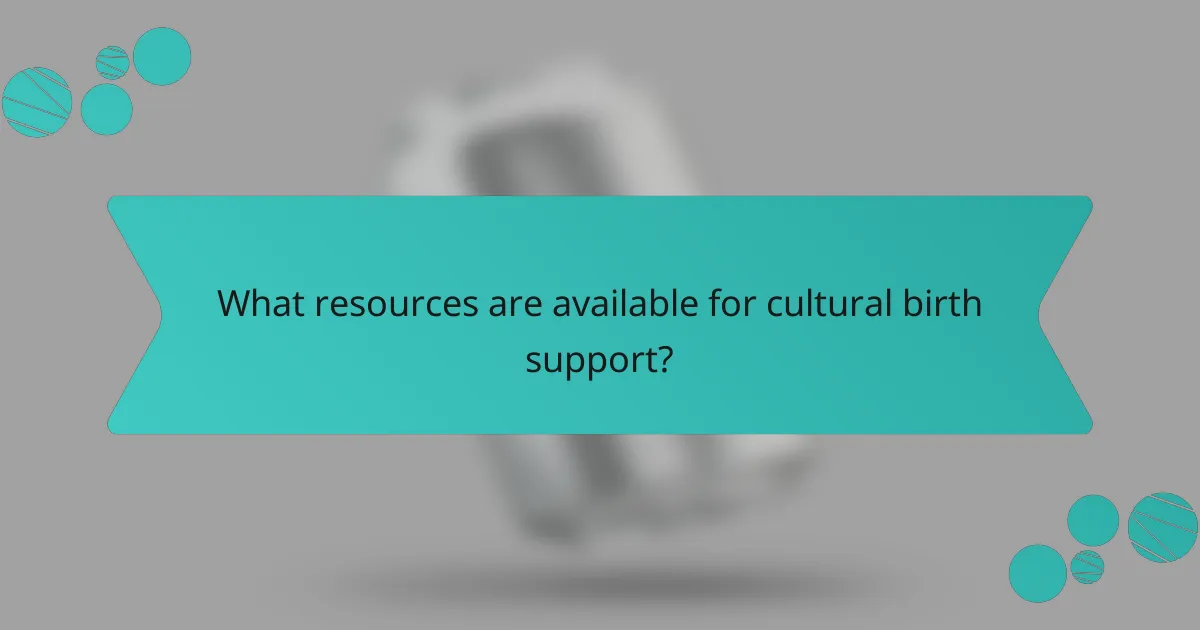
What resources are available for cultural birth support?
Cultural birth support resources include community organizations, traditional practitioners, and personalized rituals that honor diverse cultural practices. These resources aim to enhance the birthing experience by integrating cultural values and community connections.
Community organizations
Community organizations play a vital role in providing cultural birth support by offering educational programs, workshops, and resources tailored to specific cultural needs. Many of these organizations focus on promoting awareness of cultural practices and ensuring that expectant parents have access to culturally sensitive care.
For example, local non-profits may host prenatal classes that incorporate traditional practices, such as storytelling or herbal medicine. Engaging with these organizations can help families feel more connected to their heritage during the birthing process.
Traditional practitioners
Traditional practitioners, such as midwives or doulas with cultural expertise, offer personalized support that aligns with specific cultural beliefs and practices. These professionals often have training in both modern medical practices and traditional methods, allowing them to provide holistic care during pregnancy and childbirth.
When choosing a traditional practitioner, consider their experience and familiarity with your cultural background. This ensures that the support you receive is respectful and relevant to your family’s traditions.
Personalized rituals
Personalized rituals can enhance the birthing experience by incorporating meaningful cultural practices that celebrate the transition to parenthood. These rituals may include blessings, naming ceremonies, or specific family traditions that honor the birth process.
To create a personalized ritual, involve family members and consider what elements are most significant to your cultural heritage. This can foster a sense of community and connection during a transformative time.
